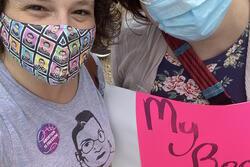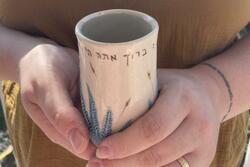Casting a Vote for Reproductive Justice
November 8 will be the first general election since the Supreme Court voted to overturn Roe v. Wade, and abortion is on the ballot. When Jewish feminists go to the polls, they’ll have the chance to affirm that abortion is a Jewish value.
Already this year, Kansas became the first state to vote on abortion since the Supreme Court’s decision overturning Roe. Kansans overwhelmingly decided that abortion was a constitutional right in the state. This is especially striking when you consider that Catholic institutions in Kansas spent millions of dollars trying to eliminate abortion rights in the state. While there might not be a large Jewish population in Kansas, this ballot measure emphasized that minority extremist religious values don’t speak for all voters.
On November 8, five states have ballot measures relating to abortion rights, which is the most on record for any election year:
- California will be voting on Proposition 1, which says that the state cannot interfere with a person’s decision to have an abortion, to use contraceptives, or to refuse contraceptives.
- Kentucky will be voting on Amendment 2, which would change the state Constitution to say that nothing in the document affirms the right to abortion or requires government funding of abortion.
- Michigan will be voting on Proposal 3, an initiative to amend its state Constitution to explicitly state that there is a right to reproductive freedom. This is defined as affirming abortion rights, contraception, and other pregnancy-related matters.
- Montana voters are deciding on LR-131, an anti-abortion bill. Essentially, the bill states that any infant born alive at any stage of development is legally a person and requires that medical care be provided after induced labor, C-section, or an attempted abortion. But not providing medical care to an infant born alive is already illegal—it’s called murder. This bill is a dog whistle, an attempt to assign personhood to a fetus before it’s born and weaken access to abortion care. So far, bills like these have been blocked or voted down in states where they’ve been on the ballot.
- Finally, Vermonters are voting on Proposal 5, an amendment to the state Constitution that would provide the right to personal reproductive autonomy. This would give Vermonters the freedom to make choices relating to contraception, abortion, and pregnancy, free from interference from the state.
Even if you live in a state without abortion explicitly on the ballot, you can still vote for reproductive justice by electing candidates who are openly pro-choice and have solid platforms for protecting reproductive rights, as well as strong support for maternal and child well-being, high-quality public education, access to welfare systems, and other social services.
As Jews, we’re obligated to engage in the political process. In Jeremiah 29:7, God commands Jeremiah “to seek the peace of the village to which I have exiled you, and pray to God on her behalf, for in her state of peace shall you too find peace.” By voting, we take an active part in creating this peace. Rabbis from every denomination support the idea that Jews should cast their ballots to improve the communities in which they live.
Election Day is a sacred moment in which we as Jews can fulfill our mitzvah to create peace for all those who need abortion access. Below is a ritual that can be done while voting. It’s divided into three parts—intention, prayer, and action—and can be done whether you’re voting absentee at home or in-person.
Intention:
Take a deep breath. Lay out your pen or open the screen on your voting machine. Take stock of what you are seeing. Listen to the people around you as they cast their ballots. This is a sacred, holy moment. Feel gratitude for your ability to exercise your free will in choosing a candidate to represent you.
Prayer:
Say to yourself or read aloud:
I acknowledge and remember my grandmother’s generation, born before abortion was a constitutional right. I thank them for forging the path that allowed millions to access legal and safe abortion care.
As I enter this holy space of decision-making, may I be reminded of the Jewish women who came before me and who fought for my right to cast my ballot. I honor their legacy with my pen.
I enter the voting booth ready to use my right to protect the rights of others. I hold with me the millions of people whose right to abortion care has been stripped away by those who do not have their constituents’ best interests in mind.
May it be your will that I cast my vote for the people who honor and trust the decision-making powers of abortion-seekers. Open my eyes to those who will work to protect abortion rights for the most marginalized and oppressed among us, who grasp the tenets of reproductive justice.
Allow me to use my ballot to protect the rights of people to choose abortion care, even if their struggles might look very different from my own.
Guide me in choosing lawmakers who see abortion care as part of a holistic network of services that strengthen our communities, in conjunction with robust childcare, fair wages, high-quality healthcare, and other social services.
I use my vote to affirm my commitment to the struggle for reproductive justice for all.
I remind myself that voting is just one tool I have to make abortion accessible. I commit to joining the fight in other areas, outside the voting booth.
Action:
Cast your vote. Smile and thank the volunteer poll workers. Look up your local practical support organization, clinic escort collective, and/or abortion fund and commit to getting involved on the frontlines.







